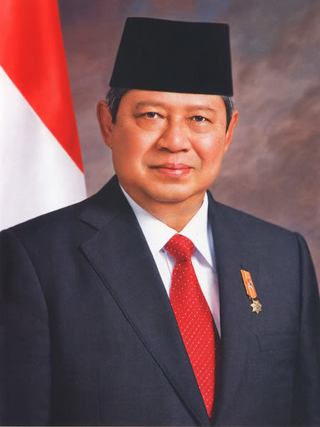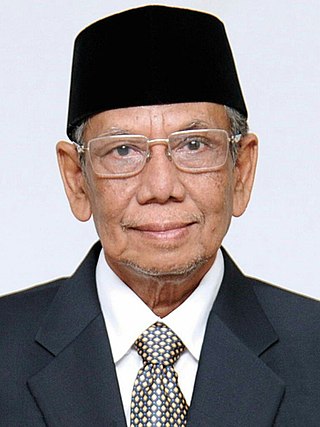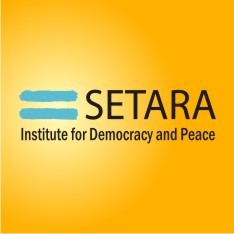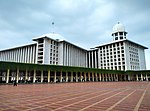
Abdurrahman Wahid, more colloquially known as Gus Dur, was an Indonesian politician and Islamic religious leader who served as the fourth president of Indonesia, from his election in 1999 until he was removed from office in 2001. A long time leader within the Nahdlatul Ulama organization, he was the founder of the National Awakening Party (PKB). He was the son of Minister of Religious Affairs Wahid Hasyim, and the grandson of Nahdatul Ulama founder Hasyim Asy'ari. Due to a visual impairment caused by glaucoma, he was blind in the left eye and partially blind in his right eye. He was the first president of Indonesia to have had physical disabilities.

The Indonesian Democratic Party of Struggle is a centre to centre-left secular-nationalist political party in Indonesia. Since 2014, it has been the ruling and largest party in the House of Representatives (DPR), having won 110 seats in the latest election. The party is led by Megawati Sukarnoputri, who served as the president of Indonesia from 2001 to 2004. It is also the former party of the current president, Joko Widodo (Jokowi).

Susilo Bambang Yudhoyono, commonly referred to as SBY, is an Indonesian politician and retired army general who served as the sixth president of Indonesia from 2004 to 2014 and the second Indonesian President from the military after Suharto. He founded the Democratic Party of Indonesia, he served as the 4th leader of the Democratic Party from 2014 until 2020, 8th and 10th Coordinating Minister of Politics and Security Affairs of Indonesia from 2000 until 2001, and again from 2001 until 2004. He also served as the president of the Assembly and chair of the Council of the Global Green Growth Institute. He was also the former chairman of ASEAN due to Indonesia's hosting of the 18th and 19th ASEAN Summits.

Nahdlatul Ulama is an Islamic organization in Indonesia. Its membership numbered over 95 million in 2021, making it the largest Islamic organization in the world. NU is also a charitable body funding schools and hospitals as well as organizing communities to help alleviate poverty.

The Prosperous Justice Party, frequently abbreviated to PKS, is an Islamist political party in Indonesia.

The National Mandate Party, frequently abbreviated to PAN, is an Islam-based political party in Indonesia.

The Post-Suharto era is the contemporary history in Indonesia, which began with the resignation of authoritarian president Suharto on 21 May 1998. Since his resignation, the country has been in a period of transition known as the Reform era. This period has been characterised by a more open political-social environment and grassroots economic improvement.

The situation of human rights in Pakistan is complex as a result of the country's diversity, large population, its status as a developing country and a sovereign Islamic democracy with a mixture of both Islamic and secular law.

Zannuba Ariffah Chafsoh, or more popularly known as Yenny Wahid is an Indonesian Islamic activist, journalist, and politician. She is currently the director of The Wahid Institute, an Islamic research center founded by her father, Abdurrahman Wahid.
Wahid or Waheed is an Arabic masculine given name, meaning "One", "Absolute One". Its feminine form is Wahida. Al-Wahid is one of the 99 names of Allah.
The Bali Holocaust Conference was held on June 12, 2007 in Jimbaran, Bali, Indonesia. The conference aimed to promote religious tolerance and affirm the reality of the Holocaust and was attended by rabbis, Holocaust witnesses, and Muslim leaders, teachers and students. This event was convened by former Indonesian president Abdurrahman Wahid, and was sponsored by the Wahid Institute, the Simon Wiesenthal Center in Los Angeles, and the Libforall Foundation. Wahid stated that although he is a good friend of Iranian President Mahmoud Ahmadinejad, his views about the Holocaust are wrong and that it really happened.

The Ahmadiyya branch of Islam has been subjected to various forms of religious persecution and discrimination since the movement's inception in 1889. The Ahmadiyya Muslim movement emerged within the Sunni tradition of Islam and its adherents believe in all of the five pillars and all of the articles of faith required of Muslims. Ahmadis are considered non-Muslims by many mainstream Muslims since they consider Mirza Ghulam Ahmad, the founder of the movement, to be the promised Mahdi and Messiah awaited by the Muslims.

Achmad Hasyim Muzadi was an Indonesian Islamic scholar and cleric who served as chairman of the Nahdlatul Ulama, from 1999 to 2010. The founder and director of the Al-Hikam Islamic boarding school, he was a proponent of moderate Islam, which he defined as being neither radical nor liberal, and criticized both Islamic fundamentalism and Islamic liberalism. Hasyim was the vice presidential running mate of President Megawati Sukarnoputri in the 2004 Indonesian presidential election, though the ticket was defeated in a runoff. He subsequently served in the Presidential Advisory Council from 2015 until his death.

Ahmadiyya is an Islamic branch in Indonesia. The earliest history of the community in Indonesia dates back to the early days of the Second Caliph. During the summer of 1925, roughly two decades prior to the Indonesian revolution, a missionary of the Community, Rahmat Ali, stepped on Indonesia's largest island Sumatra. He established the movement with 13 devotees in Tapaktuan, in the province of Aceh. The Community has an influential history in Indonesia's religious development,. However, in the modern times it has faced increasing intolerance from religious establishments in the country and physical hostilities from radical Muslim groups. The Association of Religion Data Archives estimates around 400,000 Ahmadi Muslims, spread over 542 branches across the country.

The roles of women in Indonesia today are being affected by many factors, including increased modernization, globalization, improved education and advances in technology. Many Indonesian women choose to reside in cities instead of staying in townships to perform agricultural work because of personal, professional, and family-related necessities, and economic requirements. These women are moving away from the traditional dictates of Indonesian culture, wherein women act simply and solely as wives and mothers. At present, the women of Indonesia are also venturing actively into the realm of national development, and working as active members of organisations that focus and act on women's issues and concerns.

Relations between Indonesia and Palestine have been very close and friendly. Indonesia has refused to recognize the State of Israel until a peace agreement is reached between Israel and the State of Palestine. Indonesia has strongly stood up for the rights and freedoms of the Palestinians and has supported the struggles of the Palestinians.

SETARA Institute for Democracy and Peace is an Indonesia-based (NGO) that conducts research and advocacy on democracy, political freedom and human rights. SETARA Institute is a young research organization with core research focused on answering the actual needs of society. Its establishment in 2005 was intended as a response to fundamentalism, discrimination and violence on behalf of religion and morality in many fields that threaten pluralism and human rights in Indonesia. SETARA Institute works in secular space and does not carry out research penetrating into religious theologies. SETARA Institute is a pioneering defender of freedom of religious belief in Indonesia. It promotes civil freedom and policy change to push for pluralism and human rights.

November 2016 Jakarta protests refer to an Islamist mass protest which took place on 4 November 2016 in Jakarta, Indonesia. It was attended by an estimated 50,000–200,000 protesters, and was aimed against the Governor of Jakarta Basuki Tjahaja Purnama, for alleged blasphemy of the Quran, the Islamic holy book. A counter-protest led by government officials and social activists in support of interfaith unity was led on 30 November.

Djohan Effendi was the Secretary of State of Indonesia, under President Abdurrahman Wahid from 2000 to 2001. He was an Ahmadi and belonged to the Lahore branch and was an ardent advocate for the Ahmadiyya movement. He was known for having been a prominent liberal thinker of Islam in Indonesia, more specifically based in Yogyakarta and a part of the Jogja-based liberal Islamic intellectual group known as the Limited Group led by Mukti Ali. He also served as chair of the International Centre for Religious Pluralism and voiced criticism toward the issuance of the fatwa by Majelis Ulama Indonesia targeting religious pluralism in 2005.

The Islamic Defenders Front was an Indonesian hardline Islamist organization founded in 1998 by Muhammad Rizieq Shihab with backing from military and political figures. Since 2015, Ahmad Shabri Lubis has been the organization's leader, while Rizieq Shihab holds the title of Grand Imam of the FPI for life. The FPI originally positioned itself as an Islamic religious police, mostly by conducting illegal and unauthorized vigilante operations. It also acted as an Islamist pressure group with prominent social media activism and mass mobilizations against pro-government activists, ethnic Chinese, Christian minority, as well as liberal and reformist politicians.




















